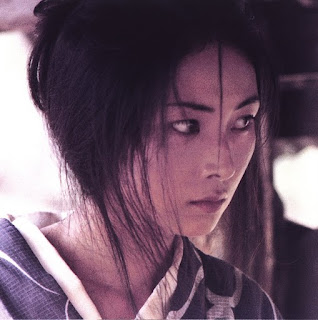Her first big break happened in 1970 when she was cast as the lead in a series of films known as Stray Cat Rock about gangs of female delinquents and their crimes and shenanigans. She played the role of leader of these rebellious young girls in such movies as Stray Cat Rock: Sex Hunter and Stray Cat Rock: Wild Measures '71. This is when Masako Ota changed her name to Meiko Kaji. Both of these films appealed to the Japanese youth at the time and her fame began to grow.
About the time Meiko was starring in the horror/chambara film Blind Woman's Curse Nikkatsu Studios began to produce a line of soft-core films known as "pink" or "roman porno" movies to attract horny young men to the theaters. These predecessors of the "pinky violence" genre involved little or no violence but had a whole lot of nudity and Meiko wanted nothing to do with them. In 1972 she switched over to Toei Studios to avoid having to be in them.
Ultimately, the migration to Toei Studios worked in her favor. There she became the star of a new series of films based on a popular manga series about female convicts. The Female Prisoner series is where Meiko would become known as Sasori or Matsu the Scorpion - the quiet, tough as nails prisoner who exacted revenge on those who betrayed her.
Unlike the previous two Girls of Grindhouse, Barbara Bouchet and Christina Lindberg, Meiko Kaji did not pose for men's magazines or have many nude scenes in her films. In fact, her first film in the Female Prisoner series, Female Prisoner 701 Scorpion is the only time that she appears naked on screen. Because of this fact and her icy, violent portrayal of Sasori, Meiko became an action heroine and a symbol of female empowerment in Japan.
In 1973 she starred in the film that we here in the West best know her for. Based on another manga character and series, Lady Snowblood was one of the main inspirations for Quentin Tarantino's two Kill Bill films more than 25 years later. In Lady Snowblood Meiko played a delicate, steely-eyed assassin dressed in white who cut down those who wronged her family. It's easy to see the direct "influence" on Lucy Liu's O-Ren Ishii character as well as the general plot in Kill Bill.
Meiko reprized her role as Lady Snowblood in the sequel Lady Snowblood: Love Song of Vengeance, played the sister of a yakuza boss in Yakuza Graveyard and then practically disappeared from films in 1978. Although she left the film industry at an early age, she has starred on Japanese television since the 1980s.
Meiko Kaji also had a successful singing career and her songs were often showcased in the films that she starred in, including Lady Snowblood and the Female Prisoner series. Tarantino included two of her songs on the Kill Bill soundtracks, as well.










No comments:
Post a Comment